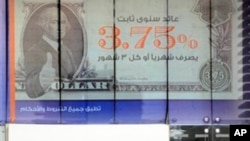Even as huge crowds protesting the government of President Hosni Mubarak continue to gather at Cairo’s Tahrir Square, many in this city of some 18 million are trying to resume a semblance of regular life.
In Cairo, nothing says normal like a traffic jam. Even the much-hated police in their signature vans can’t escape it.
The donkey carts are also back, bringing supplies to market as the fear of shortages subsides and people can get cash.
But the protests have come with a price. Not just the billions in lost tourist revenue, but the profits of small businessmen.
Ahmed’s flower shop has had few customers in the past two weeks. And he’s puzzled by the demonstrators’ demands. "This now, not good, after Mubarak. Nice Mubarak. No problem [for] me Mubarak," he said.
The violence has left many angry. Some dismiss the upheaval as a foreign plot, meant to discredit Egypt. In any case, they argue, the battles, if not the protests, are over.
The relative calm can be seen in the reappearance of street sweepers and the reopening of a few schools.
Even at Tahrir Square during the lulls, there are some who cross the checkpoints twice a day, on their way, and way back, from work.




